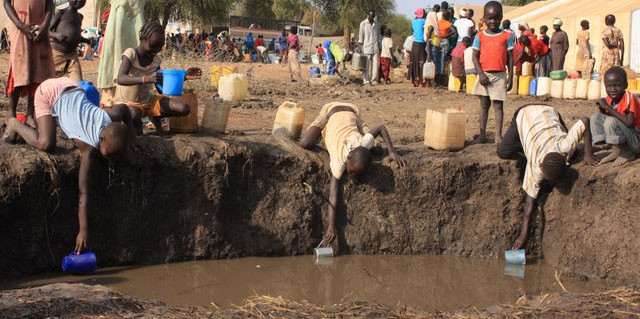A new research in rebel-controlled areas of Blue Nile in mid-2013 has proven the immediate needs of the population. “But the Sudanese government still denies humanitarian aid organisations access to rebel-held areas of the state”, the researchers stated.
Anonymous international researchers who conduct field research without approval of the Sudanese government in Blue Nile state, published their verifications through the Enough Project on 13 December. They wrote that families living in areas controlled by the Sudan People’s Liberation Movement-North (SPLM-N), have reduced the number of meals they consume to just one per day. Many interviewed families in these areas confirmed that they have only been eating porridge.
According to the Famine Early Warning Systems Network (FEWS), populations in areas held by SPLM-N, face “crisis” levels of food insecurity. The anonymous researchers verified this, as the hair and skin colour of the residents indicated malnutrition among all ages, particularly for children below five years of age.
Furthermore, a dry spell in June and July of 2013 burnt the first seeds that were planted in large swathes of SPLM-N controlled areas. This affected the harvest of 75 per cent of the population, the researchers found.
Critical health situation
Access to health facilities is limited for Blue Nile residents: some must travel roughly 65km to either Doro or Jamam camps, in South Sudan, to seek medical attention. Women and children are also forced to walk for hours to find water sources, as 40 to 50 per cent of the water points are broken due to a lack of maintenance, according to the research.
Children do not have access to any form of education as schools have remained closed since September 2011, when they became targets for aerial bombardments.
According to the UN an estimated 185,000 people needed relief assistance in Blue Nile as of 30 September. At least 121,000 refugees from Blue Nile are currently in South Sudan’s Upper Nile state, and 38,000 have found their way to Ethiopia.
The amount of research on the humanitarian situation in Sudan’s Blue Nile is little as there is limited access to the rebel-held areas. The researchers have advised that “increased unhindered humanitarian and medical access could mitigate the people’s suffering”.
File photo: Refugee children from Sudan’s Blue Nile fetch water in Doro camp (V. Tan/UNHCR)
Related:
Blue Nile displaced suffer from a lack of medical care and medicines (2 December 2013)
UN: 2000 Blue Nile refugees flee to South Sudan (23 November 2013)
2,000 new refugees from Blue Nile State arrive in South Sudan (13 November 2013)




